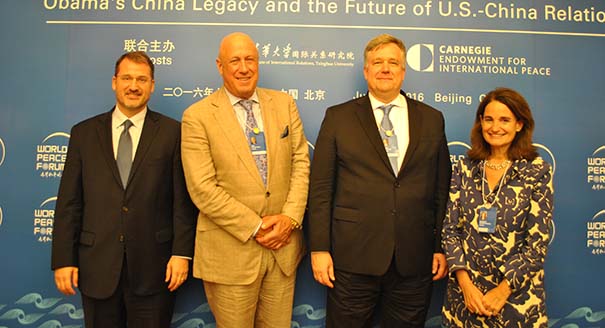Registration
You will receive an email confirming your registration.
Managing the complex and consequential U.S.-China relationship has been a key pillar of the Obama administration’s pivot, or rebalance, to the region. But competitive components of the bilateral relationship have intensified, despite the expansion and deepening of diplomatic engagement between Beijing and Washington over the past seven years, including through the establishment of the U.S.-China Strategic and Economic Dialogue and summits at Sunnylands and Yingtai. What is the impact of Obama’s policy toward a rising China? What challenges do the next U.S. administration and Chinese leadership face? How will the two giants respond to their disputes and improve mutual trust?
The Carnegie–Tsinghua Center for Global Policy hosted a panel at the fifth annual World Peace Forum—organized by Tsinghua University and the Chinese People’s Institute of Foreign Affairs—to discuss Obama’s China legacy and the future of U.S.-China relations. Carnegie’s Douglas H. Paal chaired the panel and moderated the discussion between Georgetown University’s Dennis Wilder, Elizabeth Economy of the Council on Foreign Relations, Su Ge of the China Institute of International Studies, and Ai Ping of the Chinese Association for International Understanding.
Discussion Highlights
- Assessing Obama’s China Legacy: The panelists discussed the relative strengths and weaknesses of President Obama’s China policy decisions over the past eight years. One panelist described the “Rebalance to Asia” as a recommitment to fundamental American values in the Asia-Pacific region, including the promotion of responsive governance and freedom of navigation. However, they added that one clear weakness of the policy shift has been the administration’s difficulty in evaluating and responding to China’s international initiatives, such as the Asia Infrastructure Investment Bank. A panelist noted that despite the mounting tensions with China as a result of the rebalance, the majority of the Asia-Pacific has been supportive of the growing U.S. commitment to the region.
- Cooperation on Global Issues: The past eight years of U.S.-China cooperation have yielded some tangible examples of effective bilateral dialogue, panelists said. The Paris climate negotiations, the Iran nuclear agreement, and the response to the Ebola outbreak all demonstrated substantial collaboration between the two countries in tackling pressing international issues. But a panelist contended that these were low-hanging fruit compared to the more contentious issues that will likely test bilateral relations in the near future, including the South China Sea and the launch of Terminal High Altitude Area Defense (THAAD) in South Korea.
- Deteriorating Private Sector Collaboration: Increasing political friction has also harmed exchanges between the United States and China in the private sector, one panelist argued. For the past several years, American businesses in China have complained of increasingly restrictive policies directed at the international business community. One panelist said the AmCham China 2016 Business Climate Survey demonstrates foreign companies’ frustration, faced with unclear regulations and a less-welcoming environment. Despite four years of dialogue, the United States and China haven’t committed to the Bilateral Investment Treaty, which many analysts believe would be beneficial for both economies.
- The South China Sea: One panelist framed the U.S. emphasis on freedom of navigation in the South China Sea within a larger historical context. He argued that freedom of the seas has been a consistent national priority for the United States, and that the South China Sea dispute is just the latest case of the United States supporting freedom of navigation on a global level. This is in sharp contrast to China’s view that U.S. involvement in the South China Sea as another form of strategic encirclement.
- Uncertainty Over the Next U.S. administration: Several panelists suggested that the U.S.-China relationship is in a more precarious position compared to eight years ago. In the wake of mounting skepticism toward globalization and free trade among the American public and the likelihood that the Trans-Pacific Partnership will pass under the next administration, it is unlikely that tensions will ease following the 2016 U.S. presidential election. Finally, panelists voiced concern that the Strategic and Economic Dialogues (S&ED) have diverged from their original intention to serve as a two-track system for political and economic exchanges. Diplomatic priorities have overshadowed the more achievable economic goals during the S&EDs, and economic cooperation has fallen short of the expectations of both parties, panelists said.
Douglas H. Paal
Douglas H. Paal is vice president for studies at the Carnegie Endowment for International Peace. He previously served as vice chairman of JPMorgan Chase International and was an unofficial U.S. representative to Taiwan as director of the American Institute in Taiwan.
Dennis Wilder
Dennis Wilder is a senior fellow with the Initiative for U.S.-China Dialogue on Global Issues at Georgetown University. Most recently, Wilder served as the CIA’s deputy assistant director for East Asia and the Pacific, and previous to that had roles as the senior editor of the president’s Daily Brief and National Security Council special assistant to the president and director for East Asian affairs.
Elizabeth Economy
Elizabeth Economy is the C.V. Starr senior fellow and director for Asia studies at the Council on Foreign Relations. She is a member of the World Economic Forum’s Global Agenda Council on the United States and served as a member and then vice chair of WEF’s Global Agenda Council on the Future of China from 2008 to 2014.
Su Ge
Su Ge is the president of and a senior research fellow at the China Institute of International Studies. He served as the minister counselor at the Chinese Embassy in the United States, the ambassador to the Republic of Suriname, and the ambassador to the Republic of Iceland.
Ai Ping
Ai Ping is the vice president of the Chinese Association for International Understanding and a member of the Committee of Foreign Affairs of the Chinese People’s Political Consultative conference.
